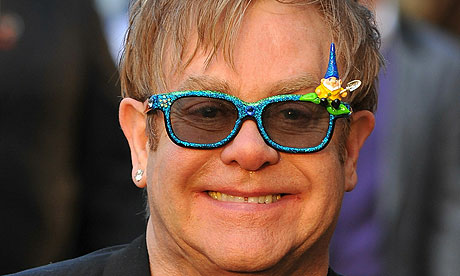Elton John has written an extraordinary new book about his life. It’s a not a kiss and tell and not how he recorded “Goodbye Yellow Brick Road” or dressed up like the Statue of Liberty on stage. It’s how he came to terms with being gay and what made him an AIDS activist. I remember when we were teenagers and suspected something was up with Elton–it was during his heyday, when no rock stars were gay. We knew he was flamboyant, but could never quite put it together. Here’s a small excerpt about his time in rehab, how it changed him. Get this book! It’s called “Love is the Cure.” I downloaded it from amazon.com Kindle because to wait for a publisher’s copy might mean me sitting here until Tisha B’av. It’s only $14.99, and the proceeds go to Elton’s AIDS foundation, so it’s well worth it.
“My time at Parkside Lutheran was as challenging as it was transformative. The first days were especially difficult. When you deprive your body of cocaine after having used very much and very frequently, as I had, the craving for it is inconceivably enormous. I went through bouts of extreme anxiety and irritability. I couldn’t sleep. I couldn’t think about anything but my own misery. This was compounded by the fact that I had stopped using not just cocaine but everything I had self-medicated with: the booze, the food, the sex. I was depressed and alone. I felt sick and weak and foggy. Needless to say, the first stages of rehab were among the most trying periods of my life. The most important part of my time in rehab was that, to all with whom I interacted, I was not Elton John the rock star. I was just Elton. Elton the addict. For years I had thought that my station in life provided me with the tools I would need to help myself. I thought I was somehow uniquely situated to overcome what other people could not.
“How wrong I was. From the moment I walked into that hospital, the playing field was leveled. We were all the same. Suffering, struggling addicts who wanted to get better but didn’t know if we could. We were all people who had made bad choices and seen the consequences, but then made the same choices despite ourselves. And we had done so again, and again, and again. The truth of it all was that simple: no matter where we had come from, what we had accomplished or failed to accomplish, what our life experiences had been up to that point, we were all the same. And none of us would get better without asking others for help. The path to recovery wasn’t a straight one, by any means. I remember quite clearly, on many occasions, wanting desperately to run away.
“Two separate times, I came awfully close to doing just that. It didn’t merely seem like the easier path; it categorically was. I could have left, been on a plane back to London, and been back in my room, with the relief that would come with the buzz of cocaine and a drink. If not for Ryan [White] and Hugh [Elton’s boyfriend at the time], I would indeed have run away. Thank God I stayed. Over time it did get easier. I could feel a genuine transformation happening inside me. I was working hard at it, and I could feel myself changing. Every day of staying sober was a challenge, but it was invigorating to feel that I was regaining control over my life, my direction, my choices. And I’d say the biggest driver of my progress was the overwhelming kindness of the strangers I met in rehab. People were remarkably helpful.”

